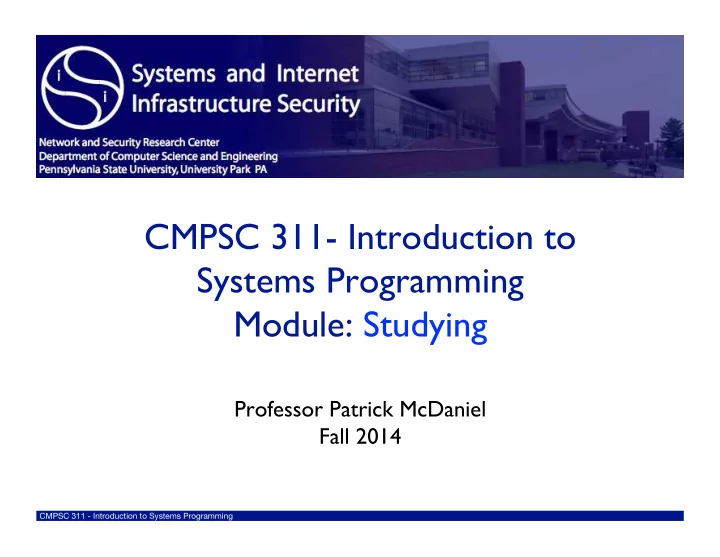

CMPSC 311- Introduction to Systems Programming Module: Studying Professor Patrick McDaniel Fall 2014 CMPSC 311 - Introduction to Systems Programming
Oops …. • Easy C class implementation CMPSC 311 - Introduction to Systems Programming Page
How to study in college. • This is really four questions: ‣ When to study? ‣ Where to study? ‣ What to study? ‣ How to study? ‣ Measuring the result? CMPSC 311 - Introduction to Systems Programming Page
Goal of studying • Q: Why do we study? • A: To understand and be able to apply? CMPSC 311 - Introduction to Systems Programming Page
Goal • Q: Why do we study? • A: To understand and be able to apply? Know what you know, what you don’t know, and know the difference. CMPSC 311 - Introduction to Systems Programming Page
When to study • Time management ‣ How you allocate your time to study is as important as any other aspect. ‣ Techniques: • Time bins: fixed allocations of time per topic/area/skill • Enforce time boundaries! (snapshot) • Work with TODO lists • Daily budgets CMPSC 311 - Introduction to Systems Programming Page
Where to study • Location/company breeds mood and outcome ‣ Isolation is often good ‣ Studying with others works for some, less so for others ‣ Library is great, Starbucks less so ‣ While watching TV is terrible • Distraction Management ‣ turn off email ‣ Pandora - avoid commercials, audio/visual interrupts ‣ Avoid “ eyes running over the page ” syndrome CMPSC 311 - Introduction to Systems Programming Page
What to study • Different contents require different approaches ‣ definitions ‣ concepts ‣ skills • Prioritization ‣ understand what is important ‣ titles of slides, red text, presence on previous tests ‣ understand the focus of the class ‣ math, programming, engineering, design, ... • Understand the outcomes ‣ what does the professor expect me to be able to do? CMPSC 311 - Introduction to Systems Programming Page
How do study • Right tool for the job ‣ Read the slides, circle things you don’t understand ‣ 3x5 cards for definitions (use as flash cards) ‣ Draw pictures • e.g., can you draw a picture of memcpy? ‣ Make up example problems/find on Internet ‣ Write programs! • For this class, this is the most important. ‣ Write summary or explain to your Mom/roommate • e.g., how does a process get more memory? • e.g., what are the two major ejection approaches for caching CMPSC 311 - Introduction to Systems Programming Page
Result • Studying is best served when you can generate something tangible: ‣ Dictionary: of terms with definitions ‣ API guide: with meaning and description of arguments ‣ Program: develop program that has a function for each API and demonstrates its use. ‣ Portfolio: labeled diagrams describing the major designs • e.g., process space, cache behavior ‣ Problem set guide: example problems • e.g., conversion of hex numbers, cache behaviors CMPSC 311 - Introduction to Systems Programming Page
Exams • Q: Why do we give them? • A: To make you study the material. • Implication : if you understand what the professor wants you to know (outcomes), then you know what will be on the test. CMPSC 311 - Introduction to Systems Programming Page
311 Outcomes? • Terminology: abstractions, application space, … • Concepts: isolation, caching, … • Language primitives: addresses, strings, structs, … • Interfaces: file I/O, memory management, … • Tools: compiler, debugger, linker, … • Skills: calculating address, coding with strings, … CMPSC 311 - Introduction to Systems Programming Page
What do I ask in exams? • Terminological/definition questions (8 questions) ‣ Asks: what are the terms and ideas (most regurgitate)? ‣ Form: short answer (1-2 sentences, sometime a single word) ‣ Weight: about 40% CMPSC 311 - Introduction to Systems Programming Page
What do I ask in exams? • Conceptual synthesis (2 questions) ‣ Asks: explain the course concepts and apply them? ‣ Form: long answer (1-2 paragraphs) ‣ Weight: about 20% CMPSC 311 - Introduction to Systems Programming Page
What do I ask in exams? • Skills demonstration (4 questions) ‣ Asks: show mastery of skills taught in class and assignments? ‣ Form: word problems ‣ Weight: about 40% CMPSC 311 - Introduction to Systems Programming Page
How to study? • Focus energy on the slides and course assignments. • Book is there for additional information, there may be a short question about content. • You should be able to perform any skill taught in class. CMPSC 311 - Introduction to Systems Programming Page
How to take? • Read the questions very carefully. • Answer what you know first. • Only try to figure out how to perform an unknown skill after you have done everything else. CMPSC 311 - Introduction to Systems Programming Page
Midterm #2 • Bit/byte operations • Strings • Memory management • Debugging • Input/output • Caching CMPSC 311 - Introduction to Systems Programming Page
How about some freebee questions? CMPSC 311 - Introduction to Systems Programming Page
Recommend
More recommend